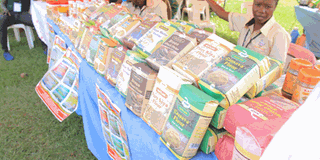What will boost Ugandan products?

A woman displays locally made porridge during a ‘Buy Uganda, Build Uganda’ expo recently. Brand Africa rankings In a category analysis, disclosed that Mukwano is the leading ‘Made in Uganda’ brand in a list that’s 42 per cent African and 58 per cent non-African. PHOTO BY RACHEL MABALA
What you need to know:
- The culture of importing goods over buying locally made products in Uganda, just doesn’t seem to stop. Brand analysts say the solution to this problem must begin with a mindset change
Drake Lubowa is a smartly dressed man who understands his sense of style.
Then there is Lucy Asiimwe. She is trendy and her sense of fashion is daring. And she does not mind spending a fortune on her wardrobe.
The two, Drake and Lucy, have a lot more in common than catchy wardrobes.
Both have an insatiable appetite for imported branded clothes. Often, their conversations are laced with labels and brands with reverence, particularly those from overseas.
Their love which is almost an obsession with anything and everything foreign, in many ways is revealing of a society that hasn’t gotten its act together.
Importantly perhaps, Drake and Lucy, both in their late twenties, see nothing wrong with their near obsession for foreign brands.
The culture of importing goods over buying locally made products, has since become a deep rooted problem. Brand analysts say the solution to this problem must begin with a mindset change.
Research
Just recently, Brand Africa in partnership with Brand Leadership, Geopoll and Kantar and Publics Africa announced the results of the Most Admired Brands in Uganda.
The list, the 7th annual Brand Africa 100: Africa’s Best Brands, is based on the comprehensive pan-Africa survey of the most admired brands among African consumers.
Results for Uganda and the region were dominated by non-African brands.
In a comparison of the most admired brands in Uganda versus East Africa region, while Nike is the leading brand in East Africa, Coke is the leading brand in Uganda.
About 80 per cent of the brands, all non-African – Coca Cola, Samsung, Airtel, Apple, Pepsi and Techno are common between Uganda and the region.
In a category analysis, the report disclosed that Mukwano, Nile Breweries, Centenary Bank and Movit as the leading ‘Made in Uganda’ brands in a list that’s 42 per cent African and 58 per cent non-African.
Established in 2011, the Brand Africa rankings is developed by pan-African branding and reputation advisory firm Brand Leadership Group, supported by GeoPoll – the world’s leading mobile surveying platform, and strategic analysis and insights by Kantar, the world’s leading data, insights and consulting company. The rankings are based on a comprehensive survey among a representative sample of respondents 18 years and older, conducted in 25 countries which collectively account for 80 per cent of Africa’s population and 75 per cent of the continent’s GDP.
GeoPoll used its mobile survey platform and its proprietary access to a database of over 250 million respondents in emerging markets around the globe to identify the most admired brands in Africa among a representative sample of African consumers.
In the main overall Brand Africa 100: Africa’s Best Brand list announced in May at the Johannesburg Stock Exchange in South Africa, while the top 100 is relatively stable, African brands faltered to an all-time low of 14 per cent share of the Top 100 most admired brands in Africa.
Over the past three years, Africa’s share of the most admired brands has declined from a high of 25 per cent in 2013/14 to lows of 16 per cent in 2015/16, 16 per cent in 2016/17 and 17 per cent in 2017/18, respectively.
Top global brand
In the Top 100, the US sports and fitness mega brand, Nike retained the overall number one brand in Africa spontaneously recalled by consumers. The most admired African brands recalled by Africans were South Africa’s leading pan-African telecoms brand, MTN, followed by Ethiopia’s Anbessa and Nigeria’s, Dangote.
“One of the biggest challenges facing Africa is transforming its vibrant entrepreneurial energy and environment to create competitive brands that meet the needs of its growing consumer market,” Thebe Ikalafeng, founder and chairman of Brand Africa and Brand Leadership said while unveiling the report in Kampala.
He continued: “…As is evident with Mukwano, Nile Breweries, and Movit, the leading made in Uganda brands, the next biggest challenge is retaining the ownership of these brands and ultimately the profits in Africa.
These rankings are an important metric and challenge for creating home-grown competitive African brands that will transform the African promise and change its narrative as a competitive continent.”
How can Ugandans Consume more local brands?
Mr Ikalafeng was also of the view that African consumers must tame their appetite for foreign brands and begin identifying with what is African just like other continents do. This will only be possible, he says, if Africans become proud of who they are Africans. He commended the ‘Buy Uganda Build Uganda,’ initiative, saying the government support in changing the tide is critical.
Before that, companies must learn to deliver on their promises. This is in addition to taking things such as packaging and standards seriously.
In an interview with the director membership at Uganda Manufacturers Association, Mr Mubarak Nkutu, the secret lies in delivering quality output.
For the Acting Secretary General of Uganda National Chamber of Commerce, Mr Steven Kabagambe, training in proper production is the key to developing branding.




